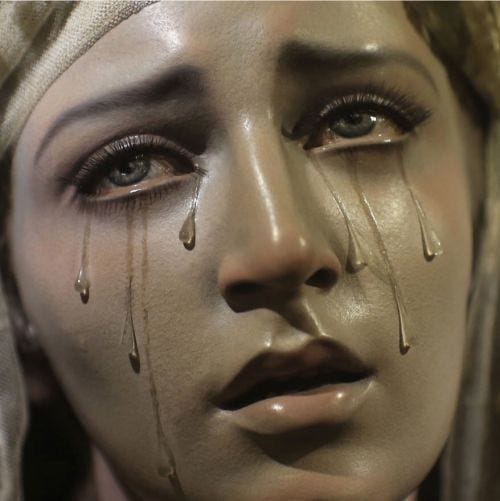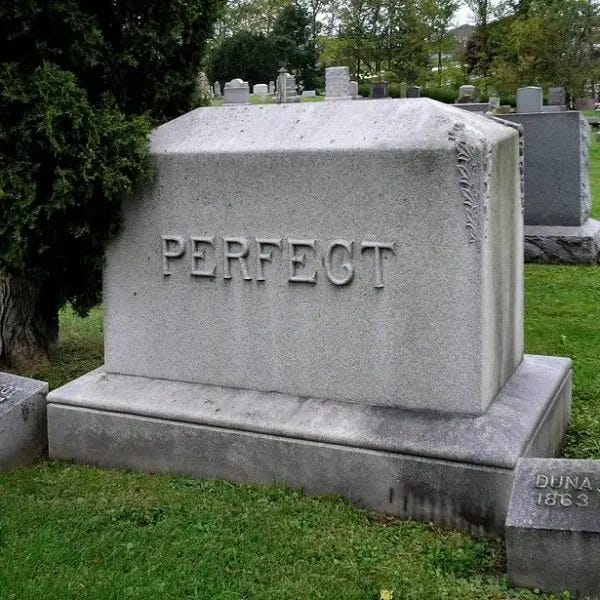Choosing Anything But Yourself: Women’s Martyrdom Is Biblical
Worshiping at the altar of selflessness, our sacred duty consumes us and causes erasure, literally.
My grandmother is Opus Dei, and each time I see her she asks: ‘Are you being a good wife?’ (As I’m writing this, an article dropped in The Guardian about 43 women suing Opus Dei for exploitation and abuse in Argentina).
She has lived a life few women know nowadays. She fell in love with my grandfather when she was just 12—he’s the only man she’s ever known and loved. She raised four children back-to-back with minimal help from my grandfather who, being a man of his times, would get home from work on a Friday, hand her his jacket through the garage fence, kiss each of his kids on the forehead, and go on weekend-long benders with his friends. They called themselves the Four Horsemen of the Apocalypse.
Historically, we’ve kept many women away from actualization by giving them titles—and roles to go along with them: daughter, wife, mother, homemaker, unlicensed therapist to your puer boyfriend.
Men are presented with gendered issues too, and yet they enjoy more freedom to choose; they’re allowed to be other things besides fathers. A man can spend a whole Saturday playing golf with the boys and wouldn’t think himself a worse father for it. On the other hand, guilt is woven into the female experience. A mom feels like she’s committing a capital offense if she dares to lock herself in the bathroom for five minutes to escape the noise of children bawling or playing.
Grandma wasn’t brought up to ask many questions—not of herself and not of the world around her. Her proudest accomplishment is that she was a mother and a wife. She often expresses how fulfilling it was, how this duty is a sacred duty. To uphold a family is a pillar belief of Opus Dei. And yet, growing up, all I can remember from my grandmother is how sad and angry she looked.
Even in Paradise, She Worked
My grandparents used to have a beach apartment in Rincón, Puerto Rico back in the early 2000s. I was very happy there. I would spend weeks on end during the summer with my grandfather. It was paradise. Sometimes, the whole family would be there, jam-packed in a two-bedroom apartment. Some of us slept on mattresses on the balcony, with the sounds of the ocean beside us, as there was no space inside for everyone. But it was fun and charming.
Her children ostracized her because she was always in a bad mood. She cooked for all of us (sometimes up to 17 people at once), she cleaned, she washed all our towels. She fumed when everyone dragged in sand into the apartment from the beach. All she asked was not to be disturbed during certain hours, when she would lock herself in a room to pray the rosary—her own form of meditation, I suppose.
Now looking back, I always think to myself: no wonder this woman projected such misery and bitterness! She took on everything, and all she got in return was that nobody wanted to be next to her. And that I can also understand, because you see—no one asked my grandmother to take on all that she did. She just felt it was her cross to bear, being the woman of the house. And I think, for most of her life, she carried that cross and pretended she loved it, when her attitude, her face, and her spirit projected: someone save me from this hell.
Inherited Resentment
My empathy for her has grown as I’ve gotten older, even though when I was younger I preferred—and adored—my grandfather over anyone else. I can only appreciate all that she did in retrospect because in reality, she and I are not so different.
I started cooking and cleaning before I knew proper spelling, a reality that was much different from my brothers’ upbringing. I made my first fried egg, unsupervised, at five years old.
I remember one of my favorite movies was Matilda—I felt much like her. Sharp and observant, and also nonconformist. If my grandmother hadn’t lived such a deprived life, I would’ve never turned out a virago. Life has a funny way of restoring balance—even biological, generational balance. Submissive, religious, devout woman in one generation; subversive, ill-tempered, disrupter in another.
And even so, I’ve had to unlearn servitude and service myself. I often find I’m carrying out certain tasks in complete resentment. I struggle letting people do things, because they do it poorly (or at least not up to my standards). But nobody asked me to do any of the things that fill me with rage and resentment. And yet… someone has to do them. So who?
We live these lives of deprivation that eventually turn us into naggers, complainers, criticizers. I see it in myself all the time. I’ve been hardwired to think about keeping the sails going, all the time—and I resent men for not having the same instincts. But it’s these very beliefs that make us into martyrs, and eventually, make us become my grandmother.
She now suffers from Alzheimer’s. And it’s my grandfather who’s charged with caretaking—as if there’s some divine justice at play. I’m going to forget this life because I never really lived it, and you’ll have to take care of me, as I did for you and your children for 70 years—the ultimate revenge.
The Bird
I’d be lying if I told you that I knew what the solution to ingrained martyrdom was. This is the only thing I can offer:
My psychologist once told me a story and said I could choose between two endings:
I’m a bird, and I took flight to cross a vast ocean. It took me many years, many obstacles were presented along the way. The journey was long, it was tiresome and hard. I finally arrived at the other end of the world and landed on a rock. I looked back and saw the immense journey I had just been on. I could either:
Look at that vast ocean I just crossed and curse the heavens for having to cross it all by myself in the first place—I could curse the winds, the sun, the rain, the sea.
Or I could look back and be amazed, in awe that I took that journey in the first place, and that I completed it and survived. I could choose to be grateful for all it showed me, and I could take flight again—maybe with more presence and a better understanding of who I am, and this time, flying in a direction that I wanted.
Maybe that’s how we escape victimhood: see the roles we’ve been conditioned to fill for what they are; make conscious choices to stop filling those roles if they feel contrary to the constitution of our souls; and take flight in a different direction—where we can feel comfortable saying no, having opinions, doing things for ourselves guilt-free. Choose nothing and no one but yourself, and see where that takes you.
If we can manage to not look at that first flight with resentment but with gratitude, we can say: thank you, but fuck that.
Now… His Duty
As for my grandmother? I recently offered to help them clean around the house. She can no longer upkeep it, and the burden has fallen on my grandfather, who’s older and tired. She might forget a lot, but she won’t forget her place. Before he could accept my help, she vehemently opposed my offer. It’s her house. It’s her duty. Now… his duty.





